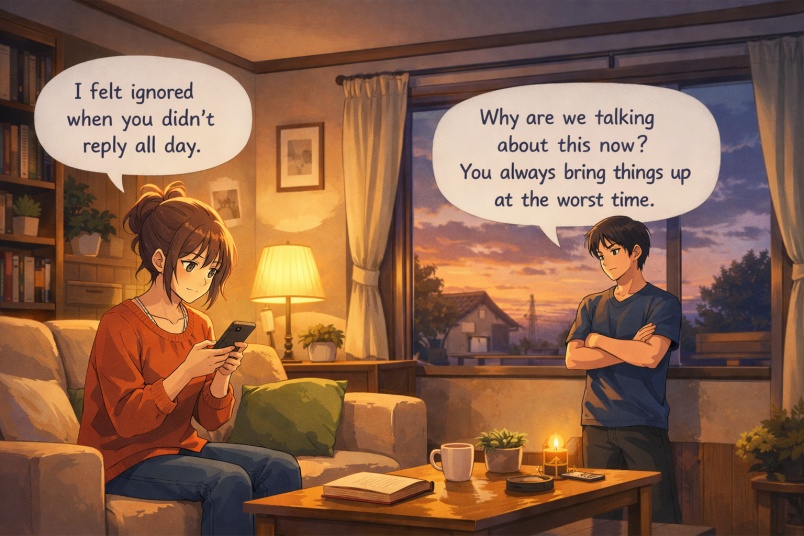15 Subtle Signs of Deflection in a Relationship & How to Deal

Heal & Grow Daily for a Happier Relationship
Subscribe FREEKey Takeaways
Marriage.com AI Quick Summary
Have you ever felt like your concerns are brushed aside?
Or perhaps, every time you try to address an issue, the conversation shifts to something entirely different… This can be frustrating and confusing, leaving you feeling unheard and misunderstood.
Deflection in a relationship can sneak in subtly, often without either partner even realizing it.
It can start small—like changing the subject or pointing out your flaws when you bring up a problem—but over time, it can create a significant barrier to open communication and emotional connection.
When one partner constantly deflects, it can leave the other feeling isolated, questioning whether their feelings are valid.
Understanding these behaviors and becoming aware of when deflection happens is important in building a more honest, supportive relationship where both partners feel safe to express their needs and concerns.
What is deflection in a relationship?
Deflection in a relationship is when one partner shifts focus away from their own actions or words to avoid taking responsibility.
It can happen in many ways—maybe you bring up a concern, and suddenly, the conversation is about something you did weeks ago… or perhaps you’re upset, but instead of listening, your partner flips the script, making it about their feelings.
Deflecting responsibility in a relationship can be confusing and hurtful. It often leaves one person feeling unheard, while the other avoids accountability.
This behavior can gradually erode trust and make open and honest communication difficult. Acknowledging these patterns is the first step toward healthier, more understanding conversations.
15 signs someone is deflecting in a relationship and why
Deflection in a relationship can be tricky to spot, especially when it’s subtle. It often involves shifting blame or redirecting a conversation to avoid addressing the real issue at hand.
Over time, these behaviors can create a barrier to open communication, making it hard to feel genuinely heard and understood. Here are 15 signs that someone might be deflecting in a relationship, along with examples of how this can show up in daily interactions:
1. Changing the subject
One common form of deflection in a relationship is when your partner changes the topic whenever you bring up something important. You might start discussing a concern, and suddenly, they’re talking about their day or a completely unrelated issue.
This can make you feel like your concerns aren’t valid or worth discussing, which can be frustrating and disheartening.
- Why this happens: This often occurs when someone feels uncomfortable with the topic at hand or fears confrontation. By shifting the conversation, they avoid dealing with the issue, which may feel safer in the moment but prevents resolution and growth in the relationship.
2. Blaming you for their feelings
Have you ever heard, “I wouldn’t be upset if you hadn’t…”? This is a classic example of deflection in a relationship.
Studies show that romantic relationships can bring significant joy and closeness to our lives. However, not all relationships succeed, and when they end, the emotions can be overwhelming, often leading to feelings of regret and remorse. This regret can be influenced by whether we choose to take action or remain passive during the relationship.
Instead of owning their emotions or behavior, your partner shifts the blame onto you. It can leave you feeling guilty or responsible for their feelings, even when it’s not truly your fault.
- Why this happens: Blaming others for their feelings can be a way to avoid accountability. It’s easier to deflect than to confront uncomfortable truths about one’s actions or emotions. This shift helps them avoid feeling vulnerable or at fault.
3. Avoiding the issue altogether
Sometimes, deflection appears to be complete avoidance. Your partner may refuse to discuss certain topics or make excuses to leave the conversation.
This can make you feel like you’re walking on eggshells, unsure of how to bring up important issues without causing a shutdown. It’s a way to avoid dealing with uncomfortable truths or conflicts.
- Why this happens: Avoiding the issue might stem from a fear of conflict or a lack of confidence in handling tough conversations. The person may feel overwhelmed by the potential outcome and choose avoidance as a coping mechanism.
4. Bringing up past mistakes
Deflecting responsibility in a relationship often involves digging up past errors—yours, specifically.
If every discussion about your partner’s behavior turns into a reminder of something you did wrong months ago, it’s a deflection tactic. This shifts the focus from their actions to yours, making it hard to address the current issue effectively.
- Why this happens: Bringing up past mistakes is a defense mechanism that helps divert attention away from their behavior. It can be a way to equalize the playing field, making them feel less at fault by highlighting your past errors.
5. Minimizing your feelings
Have you ever been told you’re “overreacting” or that you’re “too sensitive”?
These phrases can be examples of deflection in a relationship where your partner tries to downplay your emotions. By doing so, they avoid dealing with the real issue and make you question your own feelings and perceptions.
- Why this happens: Minimizing feelings is often a sign of discomfort with emotional expression. By downplaying your emotions, they protect themselves from having to engage deeply or face the impact of their actions on you.
6. Acting defensive
Defensiveness is a strong sign of deflection. When your partner reacts with hostility or anger whenever you bring up a concern, it’s a way to protect themselves from criticism.
This defensive stance can shut down productive dialogue, making it difficult to resolve conflicts and leaving you feeling unheard and unsupported.
- Why this happens: Acting defensively can be a reflexive response to feeling attacked or judged. It’s a protective measure to shield oneself from perceived threats, often stemming from insecurity or a fear of criticism.
7. Playing the victim
Deflection can also look like your partner portraying themselves as the victim in every situation.
If you express a need or concern, they might respond with how hard their life is or how much stress they’re under. This can make you feel guilty for bringing up your issues, shifting the focus away from resolving your concerns.
- Why this happens: Playing the victim can be a way to elicit sympathy and avoid taking responsibility for one’s actions. By focusing on their struggles, they shift the narrative away from the issue at hand, deflecting accountability.
8. Exaggerating the problem
Some people deflect by making the issue seem bigger than it is, turning a simple request or concern into a dramatic event.
By exaggerating, they deflect attention from the real problem and put you on the defensive. This tactic often leaves you feeling like you’re overstepping or causing unnecessary drama when you’re just trying to communicate.
- Why this happens: Exaggerating the problem can be a way to shift focus away from the original issue. It creates a sense of chaos or urgency that distracts from the actual problem, allowing the person to avoid dealing with the real concern.
9. Using humor to deflect
Humor can be a valuable tool in communication, but when it’s used to deflect serious discussions, it can be problematic.
If every time you try to talk about something important, your partner cracks jokes or makes light of the situation. It’s a way to avoid dealing with the real issue. This can feel dismissive and invalidate your concerns.
- Why this happens: Using humor to deflect serious conversations can stem from discomfort with emotional intimacy or confrontation. By making light of the situation, they create a barrier to avoid deep or uncomfortable discussions.
10. Giving vague responses
When you try to address something important, and your partner responds with “I don’t know” or “Maybe, I guess,” it’s a form of deflection.
Vague answers can hinder meaningful dialogue and make it challenging to identify concrete solutions. It’s a way of sidestepping the issue without actually addressing it.
- Why this happens: Giving vague responses is often a tactic to avoid commitment to a particular stance or action. It allows the person to remain noncommittal, avoiding accountability and keeping the conversation at a surface level.
11. Redirecting blame to circumstances
Sometimes, deflection takes the form of blaming external factors rather than accepting personal responsibility. Your partner might say, “It’s not my fault; it’s just a stressful time.”
While circumstances can undoubtedly play a role, this tactic avoids acknowledging their role in the situation and shifts the conversation away from personal accountability.
- Why this happens: Redirecting blame to external circumstances is a way to avoid personal accountability. It’s easier to attribute problems to outside factors than to confront personal shortcomings or mistakes.
12. Turning the tables on you
Another common example of deflection in a relationship is when your partner turns the tables on you. If you express a concern, they might immediately counter with something you’ve done wrong.
This tactic shifts the focus from the issue you raised to something else, leaving you feeling defensive and the original concern unresolved.
- Why this happens: Turning the tables is a way to deflect criticism and avoid addressing the issue at hand. It can serve as a defense mechanism to protect against feeling vulnerable or being attacked.
13. Overgeneralizing
Statements like “You always do this” or “You never listen” are examples of deflection in a relationship. By making broad, sweeping statements, your partner can avoid dealing with the specific issue at hand.
Research shows that romantic relationships are influenced by how individuals experience acceptance and rejection from others. Two studies found that people felt more secure in their romantic relationships on days they felt accepted. This overgeneralization impacts daily relationship security, self-esteem, and behaviors toward partners.
Overgeneralizing shifts the focus to a perceived pattern of behavior rather than addressing the particular concern you’re bringing up.
- Why this happens: Overgeneralizing can be a way to avoid focusing on the specifics of a situation. It deflects attention from the current issue by making it seem like part of a larger, unchangeable pattern, often discouraging further discussion.
14. Making it about timing
If every time you try to have a serious conversation, your partner says it’s “not a good time,” it could be a form of deflection.
While timing can be important, consistently using it as an excuse to avoid discussions can prevent issues from being resolved. It leaves you feeling like there’s never a right moment to talk about what matters.
- Why this happens: Making it about timing is often a way to avoid dealing with uncomfortable topics. It’s a method of deflection that delays addressing the issue, hoping it might go away or become less important over time.
15. Gaslighting
Gaslighting is a severe form of deflection, where your partner makes you doubt your own reality or feelings. They might tell you, “That never happened,” or “You’re remembering it wrong.”
This manipulative tactic not only deflects responsibility but also makes you question your own experiences, which can be deeply damaging over time.
- Why this happens: Gaslighting is a control tactic that aims to deflect blame and create doubt. It’s often used to maintain power in a relationship by making the other person question their memory, perception, and sanity.
Should you argue with someone who deflects your point?
Arguing with someone who deflects can feel like running in circles… exhausting and frustrating! It’s tempting to try to make your point or push for an acknowledgment, but often, this only leads to more deflection and defensiveness.
Instead of arguing, gently bring the conversation back to the original issue.
You might say, “I understand you feel that way, but can we talk about what I mentioned?”
It’s also important to set boundaries and know when to step back.
Sometimes, giving the person space to reflect without the heat of an argument can lead to more productive conversations in the future. Remember, it’s okay to take a break if things aren’t going anywhere!
7 effective ways to respond and deal with a deflecting partner
When dealing with a partner who frequently deflects, it can be challenging to keep conversations on track. You may feel as though you’re not being heard or that your concerns are being overlooked.
Learning how to deal with a deflection in a relationship takes patience and a thoughtful approach. Here are 7 effective ways to respond and help your partner understand how to stop deflecting in a relationship.
1. Stay calm and composed
It’s easy to get frustrated when your partner deflects, but staying calm is key. Take a deep breath and remind yourself that reacting with anger can escalate the situation.
By maintaining a calm demeanor, you can steer the conversation back to the main issue without adding fuel to the fire.
- What you must avoid: Avoid raising your voice or using harsh language. Reacting with anger or frustration can make your partner more defensive, making it harder to address the core issue. Staying calm helps keep the discussion productive and effective.
2. Use “I” statements
Using “I” statements can be a gentle way to express your feelings without sounding accusatory. Instead of saying, “You always change the subject,” try, “I feel unheard when the topic changes.”
This approach helps your partner understand how their actions affect you, opening the door for a more constructive discussion.
- What you must avoid: Avoid using “you” statements that can come off as blaming, such as “You never listen!” Blame can cause your partner to feel attacked and less likely to engage in an open, honest conversation.
3. Gently refocus the conversation
When deflection happens, gently steer the conversation back to the original topic.
You might say, “I see what you’re saying, but can we go back to what we were discussing?”
Licensed Psychologist and Coach Silvana Mici says that:
As a therapist, I believe that deflection often stems from a fear of vulnerability. Addressing deflection in a relationship requires open and honest communication.
Encourage your partner to reflect on their behavior and take responsibility for their actions while also being willing to listen to their perspective.
Creating a safe space where both partners can express their feelings without judgment can help reduce deflection and improve communication in the relationship.
This shows that you’re willing to acknowledge their point but also emphasizes the importance of addressing the initial concern.
- What you must avoid: Avoid dismissing their feelings or concerns when trying to refocus the conversation. Saying things like “That doesn’t matter right now” can make your partner feel unheard and defensive, which can further derail the discussion.
4. Set clear boundaries
Setting boundaries is crucial in understanding how to deal with deflection in a relationship.
Let your partner know that deflecting isn’t acceptable and that you’re committed to having open, honest discussions. Be firm but kind, making it clear that you expect mutual respect in your conversations.
- What you must avoid: Avoid making threats or ultimatums when setting boundaries. Statements like “If you deflect again, I’m done” can create more tension and fear rather than fostering a respectful and understanding dialogue.
5. Encourage open communication
Encourage your partner to share their thoughts and feelings without fear of judgment. When they feel safe to express themselves, they may be less likely to deflect.
Ask open-ended questions and listen actively, showing that you value their perspective and want to understand their point of view.
- What you must avoid: Avoid interrupting or dismissing their thoughts, even if you disagree. Interrupting can make your partner feel invalidated and may lead them to shut down or become more defensive, hindering open communication.
6. Take a break if needed
If the conversation becomes too heated or goes in circles, it might be time to take a break. Step away and allow both of you to cool down before continuing the discussion.
A little distance can help clear the air and give each of you time to reflect, leading to a more productive conversation later.
- What you must avoid: Avoid storming off in anger or using a break as a way to avoid the conversation altogether. Ensure that you communicate that the break is temporary and that you’re committed to returning to the discussion after calming down.
Watch this video where psychologist Jordan Peterson explains how to resolve an argument the right way:
7. Seek professional help
Sometimes, learning how to stop deflecting in a relationship requires outside support. A therapist or counselor can provide tools and techniques to improve communication and help both partners understand the underlying issues that contribute to deflection.
Don’t hesitate to seek professional help if you find that you’re stuck in a pattern that’s hard to break on your own.
- What you must avoid: Avoid suggesting therapy in a way that feels like a threat or a last resort. Instead of saying, “You need therapy!” try framing it as a step towards mutual growth and understanding, emphasizing that seeking help is a positive and proactive choice.
Don’t let deflection doom your relationship
Deflection doesn’t have to spell the end of your relationship! It’s a behavior that can be changed with patience, understanding, and the right approach. Remember, everyone has moments where they struggle to face uncomfortable truths or feel vulnerable.
By being aware of these patterns and learning how to handle a deflection in a relationship, you can establish healthier lines of communication. Encourage one another to speak openly, listen without judgment, and address issues head-on.
Sometimes, it takes a bit of effort and maybe even some outside help, but with commitment and care, you can build a stronger, more honest connection. Don’t let deflection stand in the way of the love and understanding you both deserve.
Want a healthier, happier relationship - one step at a time?
 Tips
Tips
Write your tip or submit a video tip
All tips are reviewed before the publishing.
Share this article on
Recent Articles
Related Quizzes
Heal & Grow Daily for a Happier, Healthier Relationship
Subscribe FREE on YouTube We'd love your feedback!
We'd love your feedback!
 Expert Q&A
Expert Q&A
Ask your question related to this topic & get the support you deserve from experts.





















 Thanks for your feedback!
Thanks for your feedback!